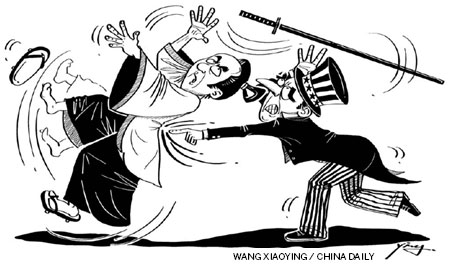
The 37-day US-Japan joint drill on Tinian Island in the Northern Mariana Islands in the Pacific Ocean from Aug 21, widely believed to be a rehearsal to take control of the Diaoyu Islands, will only add fuel to the fire raging between Tokyo and Beijing.
Though the Japanese embassy in China denied such speculation, the news that the United States and Japan have again insisted that the US-Japan Mutual Security Treaty covers the Diaoyu Islands exposes the drill's real intention. But they should know that China, like any other country, will not shy away from protecting its territories.
Washington's tactics of supporting Tokyo in the dispute will fan passions in Japan and China both and escalate the prevailing tension, which will only hurt US interests in the end.
The Diaoyu Islands dispute has intensified because Tokyo Governor Shintaro Ishihara made a farce of trying to "purchase" the islands, and Japanese right-wingers have continued to enact that farce.
Fourteen Chinese nationals landed on one of the Diaoyu Islands on Aug 15, the 67th anniversary of Japan's surrender in World War II, and were immediately arrested by Japanese security forces. That Japan deported them two days later suggested things had taken a turn for the better. But on Aug 19, several Japanese right-wing activists landed on the Diaoyu Islands despite the Japanese government's opposition and vitiated the atmosphere further.
The Diaoyu Islands have become a big stumbling block in Sino-Japan relations and could be the cause of an overall deterioration in bilateral ties. It is important for China and Japan both to handle the dispute properly. China is preparing for the 18th National Congress of the Communist Party of China. And the Japanese Democratic Party government is facing grave challenges on the domestic front. So both governments need to prevent the dispute from spinning out of control.
Ishihara's attempt to "buy" the Diaoyu Islands against the Japanese central government's wishes has exposed the weaknesses of the Noda government. And the Japanese government will have to suffer the consequences of entertaining any more demands by the right-wing forces in the country.
The Japanese central government is in an awkward situation. If it takes a tough stance over the Diaoyu Islands, it will intensify its dispute with China and cause more anxiety to the US. And if it softens its stance, it will incur the wrath of the right-wing forces and the Japanese media, which will have a negative impact on his government. So this is a testing time for the Japanese government's political wisdom and Noda's statesmanship.
The Diaoyu Islands dispute calls for urgency on the part of Japan. First, even before recent developments, the right-wingers' calls to "nationalize" the Diaoyu Islands had gained ground in Japan. So the Japanese government has to ensure that the dispute does not intensify and should take urgent steps to resolve it once and for all.
Second, to tackle its domestic problems, the Noda government could allocate funds to buy new patrol ships, build some commercial facilities on the Diaoyu Islands, or even send resident personnel to the islands. But that would be going against reason and the trend of the times. Therefore, Noda should refrain from taking such steps and instead, make more efforts to reach an understanding with China.
Till now the Diaoyu Islands dispute is under control, because China and Japan both have exercised restraint and acted rationally. But if Japan tries to "nationalize" the Diaoyu Islands, the confrontation between China and Japan is bound to escalate.
In such an eventuality, the US is likely to play a key role. The presidential election campaign is heating up in the US, Japan's close ally, and the presidential candidates are once again using "China-bashing" as a trump card, which echoes the US' return-to-Asia strategy.
But despite Japan being an ally, the US will be reluctant to have military conflicts with China over the Diaoyu Islands dispute for the sake of Japan.
Moreover, disputes between China and Japan could disturb the US' overall strategy for the Asian-Pacific region. That's why the US probably supports Japan on the surface but at the same time encourages it to negotiate with China. It's difficult for the US, still smarting under the impacts of the Iraq and Afghan wars, to spend huge amounts of taxpayers' money to go into another military conflict for the interests of Japan.
Hence, it's high time that Japanese politicians realized that it is an illusion of getting support from the US in the dispute. Maintaining stable Sino-Japanese relations is the best choice for Japan because it is in the common interest of both sides.
Both countries should avoid being kidnapped by domestic nationalist feelings and act with reason, for now is the time for them to launch high-level negotiations to eliminate confrontation and reach an understanding.
The author is a researcher with the Institute of American Studies, affiliated to the Chinese Academy of Social Sciences.
(China Daily 08/27/2012 page9)